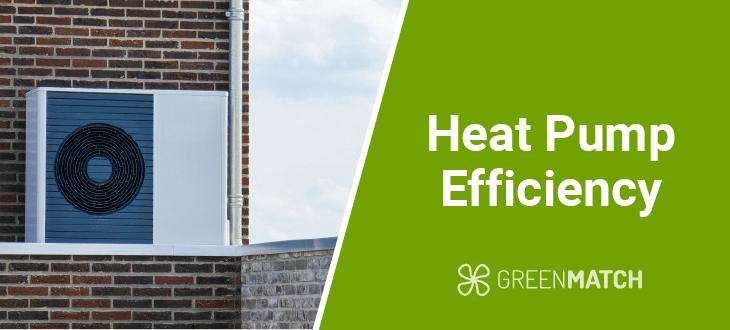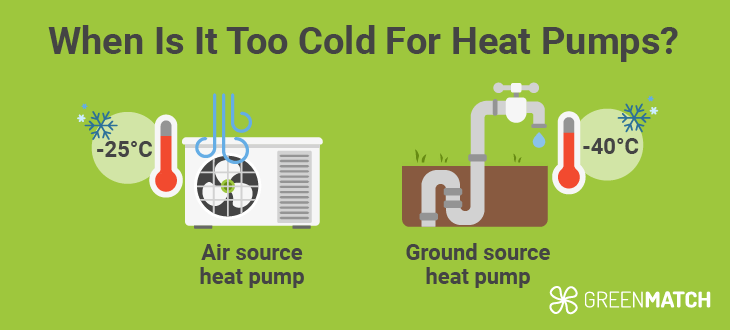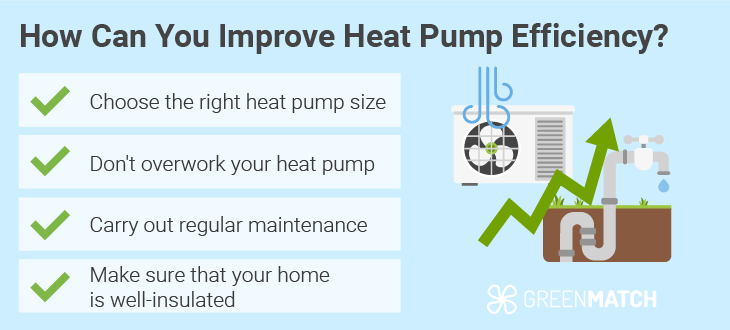Answer these simple questions and we will find you the BEST prices
Which type of solar quotes do you need?
It only takes 30 seconds
100% free with no obligation

Get up to 4 quotes by filling in only 1 quick form

Install a heat pump for less with the BUS grant

We’ve helped over 500,000 homeowners reduce their carbon footprint
- GreenMatch
- Heat Pumps
- Heat Pump Efficiency
How Efficient Are Heat Pumps? A Comprehensive Guide (2025)


- While the efficiency of traditional gas boilers is around 95%, heat pumps can be up to 350 - 450% efficient. This means that they are up to 4.5 times more efficient than boilers.
- What makes heat pumps highly efficient heating systems is the fact that they transfer heat from the air or the ground into your home, rather than generating it themselves.
- One of the main benefits of heat pump efficiency is that it allows you to avoid wasting energy in the heating or cooling process. This can significantly impact your savings and help you reduce your carbon footprint.
Heat pumps are steadily becoming a popular addition to households in the UK. This is mainly due to heat pump efficiency, which allows homeowners to reduce their carbon footprint by as much as 1900kg and save up to £550 yearly compared to a gas boiler.
In this guide, we’ll answer the question, “How efficient are heat pumps?” and explain the importance of high efficiency ratings. We’ll also compare heat pump efficiency to that of other heating systems to give you an idea of how installing a heat pump could benefit your home.
Ready to reap the financial and environmental rewards of investing in a heat pump? Then start your renewable energy journey today by filling in our 30-second form to request quotes from up to 4 heat pump installers near you. It’s quick, easy, and completely free!
- Quotes from local engineers
- Payment by finance available
- Save £7,500 with BUS grant
It only takes 30 seconds



Are heat pumps efficient?
Yes, heat pumps are highly efficient energy systems, with efficiency ratings of up to 450% for a ground source heat pump and up to 350% for an air source heat pump. This means that for each unit of electricity they consume, they generate between 3.5 and 4.5 units of usable energy for your home.
But how is that different from the efficiency of other heating systems? Take a look at the overview below to see how heat pumps compare to boiler efficiency:
| Ground Source Heat Pump | Air Source Heat Pump | Gas Boiler | Electric Boiler | Biomass Boiler |
|---|---|---|---|---|
| Up to 450% | Up to 350% | Up to 95% | Up to 99% | Up to 91% |
It’s good to know that when it comes to air source heat pumps, there is a slight difference between the efficiency of an air to air heat pump and an air to water heat pump. The former has lower efficiency levels, reaching up to 250%, whereas air to water systems are 350% efficient.
Even so, the efficiency of heat pumps is considerably higher than that of boilers. So, if you’re ready to replace a boiler with a heat pump, you can be sure that it will be a worthwhile investment in terms of efficiency.
Heat pump efficiency chart
While heat pump efficiency can be indicated in percentages, it can also be calculated in terms of Coefficient of Performance (CoP). Just like percentages, CoP indicates how much energy a heat pump generates per unit of electricity consumed.
Typically, the CoP of air source heat pumps reaches up to 3.5, whereas that of a ground source heat pump is around 4.5. However, in the case of air source heat pumps, outside temperature can lead to a decrease in CoP ratings. You can consult the heat pump efficiency chart below for a better idea of the conditions in which this happens:
What determines the efficiency of a heat pump system?
What makes heat pumps as efficient as they are is the fact that they transfer heat rather than generating it themselves like traditional heating systems. Air and ground source heat pumps work by extracting heat from either the air outside or from the ground and transferring it into your home.
This happens through a refrigeration cycle through which the heat from the air or the ground is absorbed by a refrigerant and compressed to warm up further before being transported into the house. This process can also be reversed for cooling purposes. Because they use existing warmth to function, heat pumps require less energy to operate.
What this means for you is that switching to an energy efficient heat pump can help you reduce your carbon footprint and energy bills in the long run. So, if you’re considering a ground or air source heat pump installation, you’ll want to find the right professional for the job.
Thankfully, you don’t have to search any further and waste hours of your precious free time. We’ve vetted multiple heat pump installers and can connect you with up to 4 of them in no time. Just fill in our 30-second form and you’ll receive free, non-binding quotes that you can compare to secure the best deal for your home. Click below to start now!
- Quotes from local engineers
- Payment by finance available
- Save £7,500 with BUS grant
It only takes 30 seconds



Heat pump efficiency vs temperature

A common question when it comes to heat pumps is: “Do heat pumps work in cold weather?” The answer is yes! However, if you have an air source heat pump, you might notice a drop in heat pump efficiency in the UK during the winter months if temperatures are below freezing.
At temperatures closer to -25°C, the efficiency of an air source heat pump can drop from 350% to about 100%. Fortunately, such conditions are extremely rare in the UK, so you shouldn’t notice a significant impact of the weather on your heat pump.
Another option is a water source heat pump system, which uses a nearby lake, river, or aquifer as a heat source. These systems tend to be more stable than air source units in colder weather, as water temperatures fluctuate less than air. However, they do require access to a suitable water source and more complex installation.
Nevertheless, to avoid any potential issues with your appliance once temperatures begin to drop, you should choose one of the best air source heat pumps on the market. These have a higher chance of operating efficiently even in extremely cold conditions.
When it comes to ground source heat pumps, these only begin to lose their efficiency in temperatures as low as -40°C. This is because they extract heat from the ground, which has consistent temperatures ranging from 5-15°C year round, so they are generally unaffected by weather conditions.
How to improve heat pump energy efficiency?

There are a few things you can do to maintain the efficiency of your heat pump, such as:
- Choose the right heat pump size: Heat pump sizing is important, as it determines how well your energy needs can be met. Sizes typically range from 3 to 16kW, so be sure to consult a professional if you need help determining the best size for your home.
- Don’t overwork your heat pump: Overusing your heat pump can lead to efficiency loss over time. To avoid this, you can lower the temperature and adjust it throughout the day, depending on your needs.
- Carry out regular maintenance: Periodically checking that your heat pump still functions optimally is a great way to maintain the efficiency of your heat pump. In some cases, you may need to service your heat pump, but this generally only needs to happen once every 2-3 years.
- Make sure that your home is well-insulated. Without the proper insulation, the heat generated by your heat pump can go to waste. Your heat pump may also be working overtime to keep up with your needs, which, in time, leads to heat pump energy efficiency loss.
Is a heat pump the right choice for your home?
If you’re looking to do your part for the planet by reducing your carbon emissions, then a heat pump could be a great option for you. On top of their lower environmental impact, heat pumps can also help you save up to £550 per year on your energy expenses.
So, if these impressive advantages have convinced you, the next step towards getting a heat pump is getting in touch with a certified installer. They can give you tailored advice, help you find the best ground or air source heat pump cost for your home, and assist you with applying for heat pump grants if needed.
No clue where to find a reliable installer to work with? Don’t worry - we’re here to help. We can have up to 4 local heat pump installers reach out to you with free, no-obligation quotes in no time. All you need to do is fill in our 30-second form, so click below to begin your renewable energy journey today!
- Quotes from local engineers
- Payment by finance available
- Save £7,500 with BUS grant
It only takes 30 seconds



FAQ
Air source heat pumps lose some of their efficiency once temperatures get closer to -25°C, while ground source heat pumps are only affected by outside temperatures if they get to -40°C. You should consider the impact of cold weather on your system before installing an air source heat pump.
Yes, heat pumps can have efficiency ratings as high as 450% if you have a ground source heat pump and 350% with an air source heat pump. Once installed, there are a few things you can do to maintain the high efficiency of your heat pump, so be mindful of those before investing in a heat pump.
Yes, overall, heat pumps are more efficient now than they were 20 years ago. This is because of advancements in technology that allow for the smooth operation of these devices in various conditions, such as cold weather.
While the average gas boiler reaches efficiency ratings of up to 95%, heat pump efficiency ranges from 250 to 450%. This means that they are 2.5 to 4.5 times more efficient than boilers. So, it’s worth considering whether a heat pump would be a good fit for your home so that you can enjoy the benefits of an efficient system.

Sabria Schouten is a content writer who aims to make information about sustainable energy broadly available. She believes that knowledge about how to lead a greener lifestyle should be easily accessible to anyone.
We strive to connect our customers with the right product and supplier. Would you like to be part of GreenMatch?

